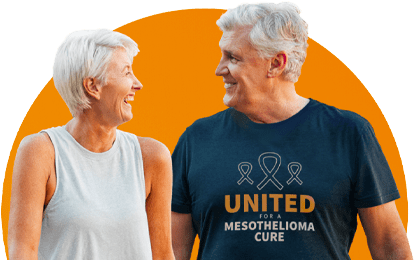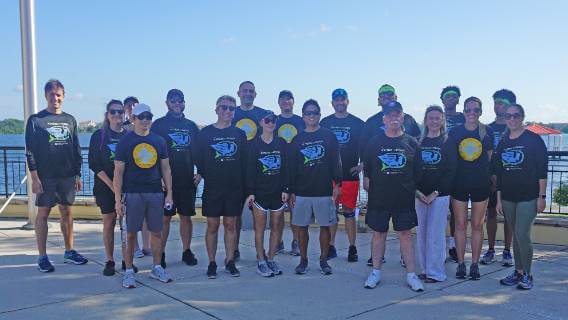Based on Your Reading:
Get Your Free Mesothelioma Guide

Find a Top Mesothelioma Doctor

Access Help Paying for Treatment

Finding the right mesothelioma support group has proven beneficial to patients and caregivers who are coping with this cancer. Some mesothelioma support groups are led by survivors, doctors and advocates.
Written by Michelle Whitmer • Edited By Walter Pacheco
The Mesothelioma Center at Asbestos.com has provided patients and their loved ones the most updated and reliable information on mesothelioma and asbestos exposure since 2006.
Our team of Patient Advocates includes a medical doctor, a registered nurse, health services administrators, veterans, VA-accredited Claims Agents, an oncology patient navigator and hospice care expert. Their combined expertise means we help any mesothelioma patient or loved one through every step of their cancer journey.
More than 30 contributors, including mesothelioma doctors, survivors, health care professionals and other experts, have peer-reviewed our website and written unique research-driven articles to ensure you get the highest-quality medical and health information.
My family has only the highest compliment for the assistance and support that we received from The Mesothelioma Center. This is a staff of compassionate and knowledgeable individuals who respect what your family is experiencing and who go the extra mile to make an unfortunate diagnosis less stressful. Information and assistance were provided by The Mesothelioma Center at no cost to our family.LashawnMesothelioma patient’s daughter


Whitmer, M. (2024, March 13). Mesothelioma Support. Asbestos.com. Retrieved May 8, 2024, from https://www.asbestos.com/support/
Whitmer, Michelle. "Mesothelioma Support." Asbestos.com, 13 Mar 2024, https://www.asbestos.com/support/.
Whitmer, Michelle. "Mesothelioma Support." Asbestos.com. Last modified March 13, 2024. https://www.asbestos.com/support/.
Various mesothelioma support organizations and resources are available to help patients, caregivers and loved ones throughout their cancer journey. These mesothelioma support organizations provide free resources, including support groups and online discussion boards.
It is important to connect with other people and organizations that understand what mesothelioma patients and their families are going through. They can provide resources and support that are tailored to your needs.
The Mesothelioma Center at Asbestos.com offers support groups, webinars featuring survivors and experts, Patient Advocates and free services for patients and families.
Our Patient Advocates help patients find doctors, schedule appointments and access funds for treatment. They connect patients and families to a variety of other resources that help them cope with the disease.
They can also help you find clinical trials, file for VA benefits and access Social Security Disability and other support services, all of which are offered for free.
The Meso Foundation is a nonprofit organization that hosts support groups for mesothelioma patients, caregivers and their loved ones. Doctors, advocates, researchers and survivors collaborate through this organization to support the mesothelioma community.
The International Mesothelioma Interest Group is a research group that formed in 1991. It organizes an international conference on mesothelioma research that takes place every two years.
The conference highlights global mesothelioma research and provides doctors with the opportunity to learn from others in the field to promote new advances in treatment and early diagnosis.
The American Cancer Society offers free lodging for eligible patients and their families via its Hope Lodge program, which includes 30 Hope Lodge locations in the U.S. For those traveling where there are no lodge locations, ACS offers assistance via grants and a partnership with Extended Stay America. Rides to treatment are available through its Road to Recovery program, volunteer drivers and grants.
Support and networking opportunities are also available through ACS’s Cancer Survivors Network and Reach to Recovery app and website for breast cancer patients. Affordable wigs, hats, scarves and mastectomy products are also available through its Tender Loving Care program.
The Pacific Mesothelioma Center is a nonprofit known for its groundbreaking research into mesothelioma treatments. It was founded in 2012 as a division of The Pacific Heart, Lung & Blood Institute.
The center sponsors the annual Walk for Mesothelioma fundraiser, which raised $580,000 in 2020.
The Canadian Mesothelioma Foundation is a mostly volunteer-run charity dedicated to raising awareness of mesothelioma in Canada. Founded in 2008, the foundation unites patients, families and doctors specializing in mesothelioma to promote better treatment and a search for a cure.
The foundation is also engaged in patient advocacy and lobbying for better policies to help mesothelioma patients and prevent future asbestos exposure.
The National Cancer Information Center has a cancer help line available 24/7. It has trained cancer information specialists who answer calls and emails from people with cancer, their caregivers, family members and friends.
The center is provided by the American Cancer Society, which also helps people find local resources and cancer support groups in their area. You may reach the center by calling 1-800-227-2345.

When you or someone you love is diagnosed with mesothelioma, it can be difficult to move forward. That is why developing a mesothelioma support system is important for everyone involved in the cancer journey.
As a patient, you may feel overwhelmed, scared and anxious. That’s completely normal. In these challenging times, it is important for you to surround yourself with those you love. Building a strong mesothelioma support system can nurture your emotional well-being, lower your stress levels and ease your fear of the unknown. Good mental health is also important while navigating mesothelioma treatment and recovery.
If you double as a caregiver and family member, remember, a solid support system is also essential for your well-being. Taking on this new role is difficult, and it is not something you should do alone. Ask for help. You can build a reliable mesothelioma support network to assist you during this challenging time.
Professional help from a mental health counselor can help you or your loved one cope with depression and anxiety. These emotions may accompany any life-threatening illness, and this is especially true if you’re diagnosed with mesothelioma. Depression is not just feeling down or blue. It is a clinical condition that may require treatment by a professional.
Clinical depression comes with a unique set of symptoms. Among them are mood swings, fatigue, feelings of sadness or emptiness that last for more than a few days, feelings of helplessness or worthlessness and changes in eating and sleeping habits.
Sources of emotional support may come from:
You or your caregiver can find emotional support through online support groups, counseling services and hospice care. Local churches and other places of worship serve as valuable sources of spiritual support, while community centers may offer free or reduced-cost counseling for cancer patients and their family members. Organizations such as the United Way and the American Cancer Society can connect you to emotional support services in your area.
Emotional support may also come from the mesothelioma community. Annual fundraising events and other opportunities raise awareness about mesothelioma and the dangers of asbestos exposure and help raise money for research.
Get Your Free Mesothelioma Guide

Find a Top Mesothelioma Doctor

Access Help Paying for Treatment

Mesothelioma patients often face emotional and financial burdens when undergoing cancer treatment. Thankfully, several organizations help ease the burden of unexpected costs and emotional stress for patients and their families.
Mesothelioma patients usually travel long distances to receive the best care. Organizations such as the Air Charity Network and Corporate Angel Network provide free flights to cancer patients who need air transportation to specialty treatment centers. The American Cancer Society’s Hope Lodge has more than 30 locations across the country. It provides cancer patients and their caregivers a home away from home when traveling for treatment.
Military veterans with mesothelioma and their family members can stay in one of 86 houses operated by the Fisher House Foundation. The nationwide network of homes has provided more than 9 million nights of lodging for veterans since 1990.
Mesothelioma treatment is costly. People affected by this rare cancer have options for financial assistance, including grants, government programs such as Medicare and Social Security, and mesothelioma compensation. Veterans diagnosed with mesothelioma are eligible for VA benefits and other forms of financial assistance. In addition to paying for treatment, financial compensation from these programs helps mesothelioma patients cover the costs of medical equipment, home care, travel expenses and end-of-life decisions.
Mesothelioma caregivers have unique needs separate from patients that require support to avoid caregiver burnout. Caregivers are the strongest source of support for mesothelioma patients, but it is essential that caregivers find their own types of support.
Experiencing grief is a normal response to losing someone you love. Joining support groups or counseling sessions can make a huge difference in your life. It takes time to cope with the loss of a loved one. Goals of grief counseling include gaining understanding about grief, identifying and expressing related emotions, learning to make decisions alone, accepting the loss and beginning new relationships.
If you are like many people who are struggling with grief, you are striving for a sense of normalcy. When participating in grief counseling sessions, hospice support staff or a licensed counselor can help you set goals for recovery. They can guide you toward achieving them.
Because mesothelioma is such a rare cancer, it can be valuable for survivors to find people living with the same diagnosis. It is also beneficial for mesothelioma caregivers to talk with others caring for patients.
Mesothelioma-focused support outlets are available online and over the phone, and general cancer support groups are available in person. It’s helpful to join several support groups to gain access to different sources of support when you need them. You may want an in-person group for when you’re feeling well enough to attend, and an online group for when you aren’t.
Patients and caregivers benefit from easy online access to these groups. You can access support from the comfort of your home, which is helpful for patients who don’t feel well enough to attend an in-person group.
For example, the Coping with Mesothelioma: Online Support Group from Asbestos.com meets monthly virtually or by phone. This support group focuses solely on people affected by mesothelioma and is led by licensed mental health counselor Dana Nolan.
The Mesothelioma Center Facebook Group is a private Facebook group that is a safe space where people often post personal stories of day-to-day challenges and milestones. Anyone struggling to cope with a mesothelioma diagnosis is welcome to join this group.
Other beneficial online support groups for people facing mesothelioma include:
Some people prefer to connect over the phone rather than virtually with a camera or in person. This provides an element of privacy that helps people feel safe to express their feelings.
The monthly Coping with Mesothelioma: Online Support Group from Asbestos.com is accessible via phone. Just reach out to us after you register, and we’ll provide you with a toll-free number to call.
The MARF Telephonic Group also meets monthly over the phone to support people with mesothelioma.
Mesothelioma-specific support groups are not easy to find because the disease is rare.
Some cancer centers that treat mesothelioma, such as Brigham and Women’s Hospital, offer support groups for people with mesothelioma. Brigham and Women’s Hospital offers a weekly mesothelioma support group for caregivers and family members, led by social workers and chaplains. The group meets Wednesdays from 12-1 p.m. in the multipurpose room on the 11th floor of the hospital.
To find support groups in your area, ask your oncology team for a list of local resources.
Searching online and asking your oncology team about support groups are great places to start.
You want to look for a group that suits your needs and schedule. A group led by a licensed mental health counselor is a plus, but good groups are also led by volunteers who have prior experience with the disease.
The monthly Coping with Mesothelioma: Online Support Group from Asbestos.com offers survivor support and access to mental health experts as well as medical experts, including a registered nurse.

Mesothelioma may be uncommon, but you’re not alone in this journey. Support groups provide a safe place to share your experiences. Licensed counselors and social workers with expertise and training lead groups that can help you cope with the disease.
Studies show patients can improve their mood and reduce their anxiety, stress levels, emotional distress, fatigue and pain by participating in support groups. Many mesothelioma support groups share new resources that could aid you outside of the group.
Support groups are not just for patients. Family caregivers are often taking on a new role and may need encouragement while coping with changes in their lives.
Some studies show cancer support group participants have higher survival rates and increased quality of life. Many mesothelioma survivors have credited a strong support system as a reason for their survivorship, improved well-being and feeling empowered.
A 2022 systematic review published in Psyco-Oncology analyzed 29 studies on the effects of support groups in helping cancer patients feel empowered to face the diagnosis. The review found a positive association between support groups and cancer patients feeling empowered personally and empowered to take action to improve their situation.
Raising awareness about mesothelioma drives research efforts in the hope of finding a cure.
Several national events and fundraising campaigns across the nation get the word out, but every day is an opportunity for patients and their family members to advocate for research and awareness.
Advocacy efforts to raise awareness and funds for research help those with mesothelioma feel supported and provide hope that a cure will be discovered.
Since 2010, Congress has recognized Sept. 26 as National Mesothelioma Awareness Day. Patients and family members are encouraged to wear blue and share photos and stories on social media of how this cancer changed their lives.
Miles for Meso is a fundraiser held annually in honor of Mesothelioma Awareness Day. People gather in person or virtually to walk or run in support of families facing a difficult diagnosis. Money raised goes toward research to discover new mesothelioma treatments.

The Mesothelioma Applied Research Foundation organizes the annual International Symposium on Malignant Pleural Mesothelioma. The conference brings together patients and experts to discuss the latest advances in treatment.
National Asbestos Awareness Week typically occurs in the spring and gives patients and their family members an opportunity to educate others about the dangers of asbestos exposure, which is the primary cause of mesothelioma.
The Asbestos Disease Awareness Organization, the leading nonprofit in the fight to ban asbestos in the United States, hosts the multiday International Asbestos Awareness Conference annually.
Your web browser is no longer supported by Microsoft. Update your browser for more security, speed and compatibility.
If you are looking for mesothelioma support, please contact our Patient Advocates at (855) 404-4592
